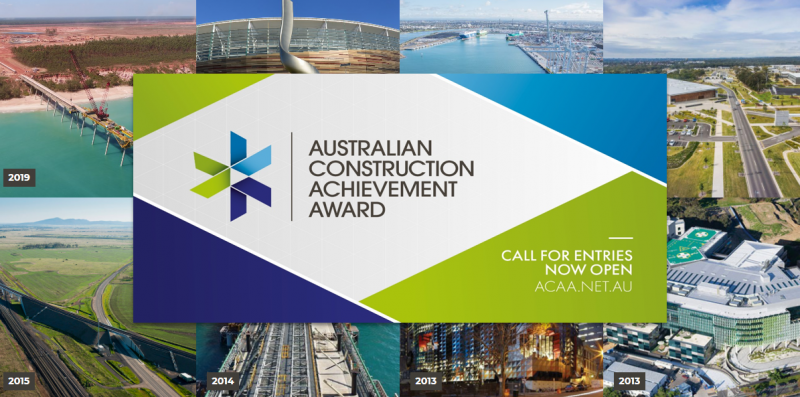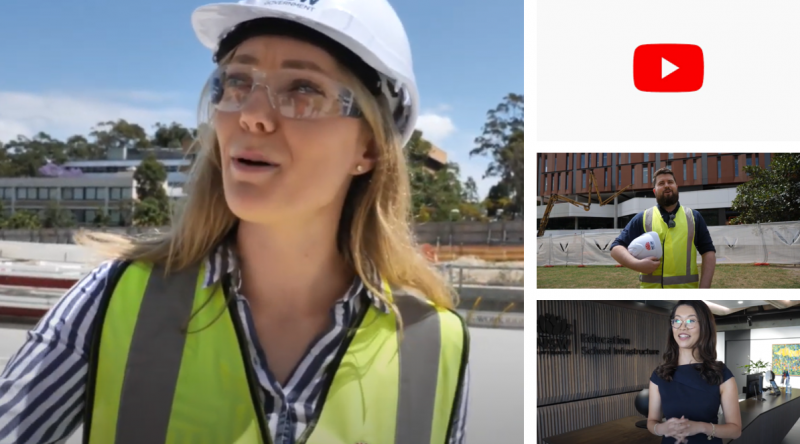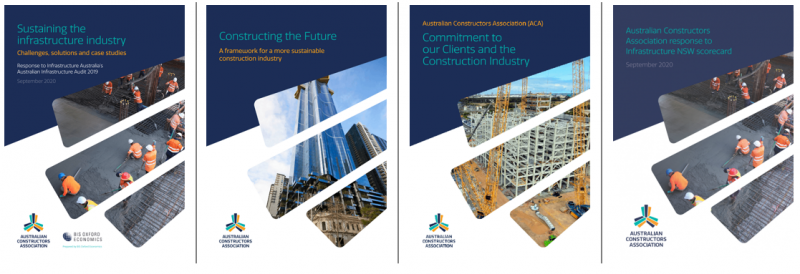CEO update – January 2021
Posted: 28th January 2021
Posted in: ACA News

Posted: 28th January 2021
Posted in: ACA News

In late 2020, the Australian Constructors Association (ACA) published a series of documents that charted a clear way forward to a more sustainable industry. Starting with an analysis of the most pressing problems facing the industry, we then developed a framework for a more sustainable sector, followed by an industry charter containing 10 commitments to reform embraced by our membership comprising Australia’s leading construction and infrastructure contracting companies. This thought leadership has been extremely well received by a range of industry stakeholders and will provide a solid platform for our advocacy efforts going forward.
Dedicated to promoting a sustainable construction industry for Australia, the ACA remains focused on strengthening the three pillars we believe support the sustainability of the industry:
Each pillar is equally important, and all are interlinked.
Strengthening these pillars requires collaboration and a commitment to action. Everyone, including industry, has a part to play. Outlined below are some of the activities the ACA will be undertaking this year.
Lobbying the Federal Government
In what may be an election year, the ACA will be calling on the Federal Government to take a more active role in defining and incentivising use of best practice procurement and delivery processes. The ‘Construction Playbook’ recently published by the UK Government is a good example of how this can be done. If we could just halve the gap in productivity growth between the construction industry and other industries over the past 30 years, we could construct an extra $10 billion of infrastructure every year for the same level of expenditure. This will be vital in a post COVID-19 world with high levels of government debt but no less of a requirement to construct productivity enhancing infrastructure.
Construction Industry Leadership Forum
To increase the efficiency of procurement and delivery processes, the ACA will continue to work closely with the NSW and Victorian Governments through the Construction Industry Leadership Forum (CILF) with the partners looking to involve other jurisdictions and stakeholders during the course of 2021. CILF focuses on ways to improve the effectiveness and value of the procurement and delivery of governments’ infrastructure programs. CILF has already influenced many positive industry changes. As an example, it is highly unlikely that without CILF, the Victorian Government would have changed the procurement process for the massive North East Link Project from a traditional hard dollar PPP to an Incentivised Target Cost model. It has also led to a trial of an innovative approach to discussions on risk allocation during the tender stage of this major project.
Construction Industry Culture Taskforce
Expanding on CILF, the Construction Industry Culture Taskforce (CICT) will continue to explore opportunities for government and industry to work together to improve the culture of our industry. While there have been some improvements in recent times, construction workplaces and behaviours need to take a quantum leap if we are to make our industry a more resilient and attractive sector to work in, particularly for women. CICT will shortly start consultation on a draft Culture Standard that seeks to align all parts of industry on the requirements necessary to make this leap.
Measuring the 10 industry commitments
Meeting the need for accountability and self-reflection, the ACA will be reviewing how well we are adhering to the commitments listed in our publication Commitment to our Clients and the Construction Industry. We will be working with our members to measure how we are tracking in our quest to reduce conflict and drive greater efficiency, lift the skills base of the nation and ensure the benefits of projects are spread across all stakeholders – not captured by a few.
Working Parties
Beyond these public initiatives, our specialist working groups, the engine room of the association, are developing solutions to address major industry challenges and initiatives that will help us meet our commitments. Stay tuned for more on these over the coming months.
Looking ahead
In the past, the ACA has performed much of its work behind the scenes. This year, we intend to step into the spotlight and lead the calls for change. Now is the time. With governments relying heavily on the construction industry to lead the economy out of recession, the challenge will be ensuring that any improvements lead to lasting change that is not reversed when the market changes. We have a unique opportunity to improve our industry, but it will require the support of the entire sector.
Are you with us?
Regards,
Jon Davies
Chief Executive Officer

The ACA and Engineers Australia are again proud joint presenters of the Australian Construction Achievement Award (ACAA).
Now in its 24th year, this prestigious award is the most significant event of the year for the construction industry. The ACAA brings together the best construction projects, delivered by the nation’s top construction companies. The event showcases the finalists and highlights the innovation and project skills of each organisation among 500 attendees.
This year’s black-tie event will be held in Melbourne on Thursday 26 August at the Grand Hyatt. It will be a hybrid event with participants also able to join online. This year promises to be bigger and better with both the 2020 and 2021 winners to be announced.
If you have not already submitted an entry there is still time. The call for entries close at 5pm AEST Thursday 28 January 2021. Event registration will open in March.
Limited event sponsorship opportunities are still available. If you are interested in supporting the event please contact us.
Visit the ACAA website for more information.
Infrastructure Australia has invited the ACA to participate in the development of the 2021 Australian Infrastructure Plan. The plan will establish a reform agenda for the next 15 years across transport, energy, waste, water, telecommunications and social infrastructure.
As part of the reform pathway, Infrastructure Australia proposes to identify actions to improve behaviours, culture, process, roles and responsibilities, and a collective approach to infrastructure delivery and operations across these sectors.
This month, the ACA will be meeting with Infrastructure Australia and their alliance partner HKA. In the meantime, Infrastructure Australia is undertaking a nation-wide survey to gain an industry perspective on the desired future state of the Australian infrastructure sector. The survey is part of Infrastructure Australia’s process for developing its 2021 Australian Infrastructure Plan. Survey feedback will help shape the direction for infrastructure policy and reform.

The NSW Government has designed a new traineeship in the infrastructure industry for Year 12 school leavers. The two-year government funded program will see candidates combine NSW Government and industry experience to develop a rounded view of the sector. The traineeship is office-based. Each candidate will undertake eight-month rotations to gain exposure to the broader industry, while understanding the important role of each partner and organisation in successfully delivering public infrastructure.
Trainees will study one day a week to complete a Cert III or Cert IV in courses such as project management and procurement, and will experience placements in business, project management, procurement, surveying and conservation.
The NSW Government is seeking support from contractors and consultants to partner and host trainees, particularly those with regional offices in Penrith, Woolongong, Grafton, Dubbo, Parkes, Lismore, Wagga and Newcastle.
This is a great opportunity to demonstrate our commitment to improving industry diversity and, in particular, improving the attractiveness of the industry to the next generation of school leavers.

ACA is participating in the Future of Construction Summit – FCO21, taking place in Sydney from 12-13 May 2021. Key event themes include disruption, sustainable construction, digitisation and technology, industrialisation and offsite production, collaboration and innovation.
To find out more click here.
